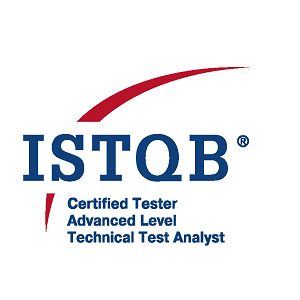ISTQB Advanced Technical Test Analyst Course Description
This ISTQB Advanced Technical Test Analyst, which is a more advanced level, offers a wide range of various test topics.
ISTQB Advanced Technical Test Analyst Objectives
After completing the Technical Test Analyst course, you will be able to:
- summarize the general risk factors that the technical test analyst should typically consider.
- summarize the activities of the Technical Test Analyst within a risk-based approach to testing activities.
- write test cases of a particular specification item by applying the Statement test technique to achieve a certain level of coverage.
- write test cases of a particular specification item by applying the mc/dc (Modified Condition/Decision Coverage) testing technique to achieve coverage.
- write test cases of a particular specification item by applying the multi-condition test technique to achieve a certain level of coverage.
- write test cases of a particular specification item by applying McCabe's simplified baseline method.
- explain the applicability of API testing and the types of defects it finds.
- select an appropriate white-box testing technique based on a particular project situation.
- use the control flow analysis to detect if code has control flow anomalies.
- explain how data flow analysis is used to detect if code has data flow anomalies.
- Suggest ways to improve code maintainability by applying static analysis.
- Explain the use of call graphs for establishing integration testing strategies.
- apply the dynamic analysis to achieve a specified goal.
- analyze for a particular project and for a tested system determine the non-functional requirements but also write the respective sections of the test plan.
- for a particular product risk, define the specific non-functional test type(s) that are most appropriate.
- understand and explain the life cycle stages of an application where non-functional tests should be applied.
- for a given scenario, define the types of defects you might expect using non-functional test types.
- explain the reasons for including security testing in a testing strategy and/or testing approach.
- Explain key aspects to consider when planning and specifying security testing.
- explain the reasons for including reliability testing in a testing strategy and/or testing approach.
- explain key aspects to consider when planning and specifying reliability testing.
- Explain the reasons for incorporating performance testing into a testing strategy and/or testing approach.
- Explain key aspects to consider when planning and specifying performance-efficiency testing.
- Explain the reasons for including maintainability testing in a testing strategy and/or testing approach.
- explain why portability testing should be included in a testing strategy and/or testing approach.
- explain reasons for compatibility testing in a testing strategy and/or testing approach.
- explain why an assessment preparation is important to the technical test analyst.
- analyze an architectural design and identify problems using a checklist in the syllabus.
- analyze a section of code or pseudo-code and identify problems according to a checklist in the syllabus.
- summarize the activities that the technical test analyst performs when setting up a test automation project.
- summarize the differences between data-driven and keyword-driven automation.
- summarize common technical issues that cause automation projects to fail to achieve planned return on investment.
- building keywords based on a particular business process.
- summarize the purpose of flaw seeding and flaw injection tools.
- summarize key features and implementation issues for performance testing tools.
- explain the general purpose of tools used for web-based testing.
- explain how tools support the practice of model-based testing.
- Explain the purpose of tools used to support part testing and the build process.
- Explain the purpose of tools used to support mobile application testing.
Result ISTQB Technical Test Analyst training
After completing the ISTQB Technical Test Analyst course, you will be able to:
- recognize and classify the typical risks associated with the performance, security, reliability, portability and maintainability of software systems.
- provide technical elements for the planning, design and execution of tests to mitigate performance, safety, reliability, portability and maintainability risks.
- Select and apply appropriate whitebox testing techniques to ensure that tests provide an adequate level of confidence, based on design coverage.
- Participate effectively in reviews with developers and software architects applying knowledge of typical defects in the code and architecture.
- improve the quality characteristics of code and architecture by using various analysis techniques.
- Outline the costs and benefits of introducing certain types of test automation.
- select appropriate tools to automate technical testing tasks.
- understand the technical issues and concepts when applying test automation.
We also offer other TestManagement workout like the ISTQB Foundation en Tmap Suite Test Engineer.

